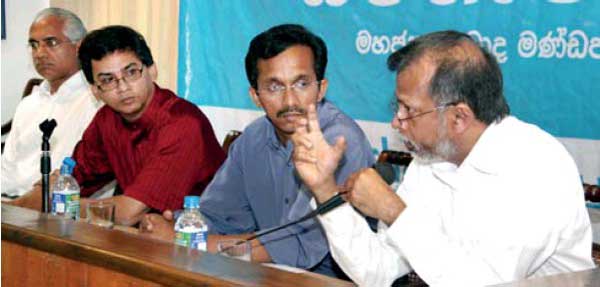EPF, NSB, Govt. face barrage of criticism
1 June 2012 03:20 am Views - 7406

Former Director General of the SEC, Arittha Wickramanayake (far right) stresses a point during the panel discussion. Two other panelists Sunil Hadunnetti and Eran Wickramanayake and moderator of the discussion journalist, Amal Jayasinghe are listening to him keenly (Pic by Kushan Pathiraja)
JVP parliamentarian Sunil Hadunnetti stated that the average and poor investors in Sri Lanka were suffering because of the adhoc and shady investments by the EPF.
“The government has used the monies of NSB and EPF which the public entrusted them with, to manipulate the share market of this country, and they need to take the responsibility for this at least now,” he said addressing a public gathering on Insider Trading on Wednesday (30), organized by Transparency International (Sri Lanka chapter).
He also pointed out that in the past, the Colombo Stock Exchange (CSE) was termed as the best in Asia, because the government was creating a rosy picture using EPF funds to control it.
“The government is to be blamed for all the problems the country’s capital market is currently facing. I can say this without any doubt and there are enough and more evidence to justify this,” he stressed. United National Party le gislator, Eran Wickramaratne speaking at the forum accused EPF and NSB of robbing the people’s money and savings. “The NSB deal is only the tip of the ice berg,” he said.
Touching on the issue of the EPF (2011) annual report not yet being presented to the Parliament, Wickramaratne noted that only the 2010 report has been presented to the Parliament and that too after the lapse of 17 months.
“The regulator requires listed companies to submit their financials every quarter, and an annual report every financial year, else they are penalized. Why isn’t there a system to check on the EPF similarly?” he questioned.
“I directly blame the Central Bank Governor and the Commissioner General of Labour for their negligence,” the UNP parliamentarian further said adding that they have misled the people of the country through the 2010 report.
According to him, the EPF is required to report about their investments in all listed and nonlisted companies separately in their annual report, but they have not adhered to this requirement. “However, the regulators require private sector companies to disclose every single detail,” he noted.
Wickramaratne went on to name some unsuccessful investments made during the past financial year by the EPF are Ceylon Grain Elevators, Galadari Hotels and Laugfs Gas. “Every single unsuccessful investment made by the EPF is a loss to the fund’s beneficiaries,” he pointed out.
“The government needs to bare in mind that the EPF is not their private fund but a fund of people. We need to inform the trade unions about this scandal and protect them as well,” he added.
Also addressing the gathering, Arittha Wickramanayake, Former Director General, Securities and Exchange Commission of Sri Lanka (SEC) charged that parties who are involved in various kinds of wrong doings in the stock market are treated as heroes or idols by some media organizations. “Their work is lauded by some of the newspapers and it was sometimes even termed as a ‘Golden touch on the market.”
He stated that these people are shameless and talk very highly of their deals, and they must be dealt with tightly.
Wickramanyake cautioned that the credibility of the market has fallen and will continue dip further because of a group of dealers.
“Many senior investors who kept the market up and running have now left because of such people and the lack of credibility in the market, which is a huge loss,” he explained.
Meanwhile, Wickramanayke commended the recent measures taken by the SEC to tighten regulations and its attempts to restore market credibility.
"It’s a good sign that we finally have a regulator watchful and sending strong messages to the market at least after the NSB fiasco,” Wikramanayake said urging the SEC to remain firm and objective. The regulator reversed the controversial National Savings Bank (NSB) and The Finance Co. (TFC) transaction and ruled that large transactions of 20 percent and above need stock exchange approval. It also issued a directive limiting short term trading of stockbrokers. The new rules come into effect from today (June 1).
Since SEC’s new regulations, Colombo’s main index has fallen, with brokers blaming the drop on excessive regulation.
The former securities regulator said even in the past these investors stayed away from the market when SEC took a tough stand, and when the market started falling, the government intervened and reversed or relaxed the SEC regulations.
He also accused the NSB for tarnishing the credibility of the CSE’s settlement system and noted that each time foreign investors come in, the first thing they inquire is the level of credibility in the system.
“Now we can’t honestly say that our settlement system is flawless. Prior to this deal, we didn’t have any problems of this sort,” Wickramanayake said.
NSB, Sri Lanka’s biggest savings bank, bought a 13 percent stake in the loss-making TFC at 60 percent above the market price on April 27. The controversial deal was aborted on the instructions of President Mahinda Rajapakse and Treasury Secretary after the state bank’s unions brought it to their attention. NSB also fell foul with the securities market, after failing to cancel the deal within the mandatory period (T+1) and later defaulting on payment. As pressure mounted from the regulators, media, and opposition legislators led by Harsha de Silva, NSB’s chairman, Pradeep Kariyawasam and a working director, astrologer Sumanadasa Abeygunawardena quit from their board seats early part of last month.
The SEC suspended Dinal Wijemanne, the chief executive of Taprobane Securities Limited, who acted on behalf of the buyers and sellers. Wijemanne, who was among the key sellers, was also a non-executive director on the TFC board.

